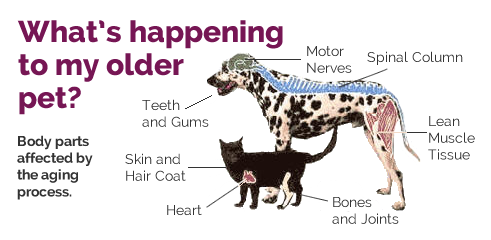Rise by Six: Your Daily Dose of Inspiration
Explore insights and stories that elevate your day.
Keeping Tails Wagging: Secrets to Happy Senior Pets
Unlock the secrets to a joyful life for your senior pets and keep those tails wagging! Discover tips for health, happiness, and bonding now!
How to Recognize and Manage Common Health Issues in Senior Pets
As our furry companions age, they may experience a variety of health issues that can affect their quality of life. It's essential for pet owners to recognize the signs of common health problems in senior pets. Some indicators include changes in appetite, weight loss, excessive thirst, or increased lethargy. Additionally, keep an eye out for behavioral changes such as increased irritability or withdrawal. Regular veterinary check-ups are crucial, as they can help detect underlying conditions early and provide tailored advice for your pet's specific needs.
Managing the health of senior pets involves proactive measures and adjustments to their routine. Firstly, consider a nutritionally balanced diet tailored to meet the dietary needs of older pets. This may include supplements to enhance joint health or improve their overall immune function. Secondly, ensure your pet remains active with gentle exercises like short walks or playtime that suit their physical capabilities. Lastly, create a comfortable environment for them, including cozy bedding and easy access to their favorite spots, which can significantly enhance their well-being.

Top Tips for Enhancing the Comfort and Happiness of Your Aging Dog
As our furry friends age, their comfort and happiness become paramount. To enhance the well-being of your aging dog, consider modifying their living space. Create a cozy environment with soft bedding and easily accessible food and water bowls. Additionally, opt for non-slip rugs or mats to prevent any slips and falls, which can be common in older dogs. Regular check-ups with your veterinarian will help monitor their health and update their diet to suit their changing needs.
Another important aspect is to maintain an active lifestyle that suits their energy levels. Incorporate gentle exercises like short walks or play sessions that cater specifically to their capabilities. Mental stimulation is equally crucial; consider interactive toys or puzzle feeders to keep their minds engaged and sharp. Lastly, shower your aging dog with plenty of love and attention. Regular cuddles and affection can significantly boost their mood, making them feel cherished and happy in their golden years.
What Nutrition Changes Should You Make for Your Senior Pet?
As your pet ages, their nutritional needs change significantly. It's essential to adjust their diet to accommodate these changes to maintain their health and vitality. Start by considering a diet that is lower in calories to prevent obesity, a common issue in senior pets. Incorporating high-quality protein sources, such as lean meats or fish, can help preserve muscle mass, which naturally declines with age. Additionally, increasing fiber in their diet can aid in digestion and help prevent constipation, a frequent problem in older animals.
Alongside dietary adjustments, it’s beneficial to include supplements tailored for senior pets. Omega-3 fatty acids can provide anti-inflammatory benefits, potentially easing joint pain and discomfort associated with arthritis. Furthermore, incorporating antioxidants like vitamins C and E may support overall health and enhance the immune system. It’s crucial to consult with your veterinarian before making these changes to ensure they are appropriate for your pet's specific health conditions and needs.